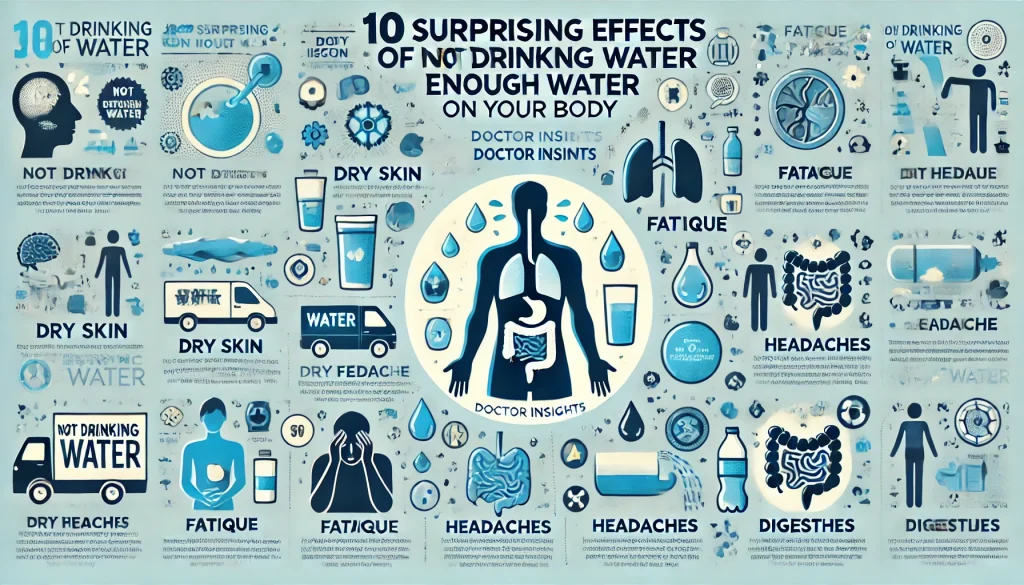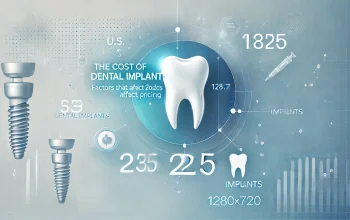10 Surprising Effects of Not Drinking Enough Water on Your Body: Doctor Insights

Water is vital for human survival, playing a crucial role in almost every bodily function. However, many people underestimate the importance of adequate hydration. The effects of not drinking enough water can be profound, impacting everything from your physical health to your mental well-being. In this article, we’ll explore the consequences of dehydration, backed by insights from medical professionals.
Table of Contents
1. Dehydration and Its Immediate Effects
What Doctors Say About Dehydration
Dr. John Batson, a sports medicine physician, explains that dehydration occurs when the body loses more fluids than it consumes, leading to an imbalance that disrupts the body’s normal functions. Even mild dehydration can have significant effects, including headaches, fatigue, and dizziness.
Symptoms to Watch For
According to Dr. Tamara Hew-Butler, an exercise science professor, common signs of dehydration include dark urine, dry skin, and a rapid heartbeat. If these symptoms are ignored, dehydration can escalate to more severe conditions like heat exhaustion or heat stroke.
2. Impact on Physical Performance
The Link Between Hydration and Energy Levels
Dr. Batson highlights that water is essential for maintaining energy levels. Dehydration causes a reduction in blood volume, making it harder for the heart to pump blood. This leads to fatigue and decreased physical performance, particularly during exercise. Even a 2% decrease in body water can significantly impair athletic performance.
Muscle Cramps and Joint Pain
Dr. Kelly Starrett, a physical therapist, notes that dehydration can lead to muscle cramps and joint pain. Water helps lubricate joints and maintain muscle function, and without enough water, muscles are more prone to cramping, and joints can become stiff.
3. Cognitive Impairment
Dehydration Affects Brain Function
Dr. Lawrence E. Armstrong, a professor of physiology, states that the brain is highly sensitive to hydration levels. Dehydration can lead to cognitive impairments such as difficulty concentrating, memory lapses, and decreased alertness. A study published in the journal Frontiers in Human Neuroscience found that even mild dehydration can negatively affect mood and cognitive performance.
Mood Swings and Anxiety
Dr. Adam Nadelson, a psychiatrist, explains that dehydration can also impact mental health, leading to mood swings, anxiety, and irritability. Staying hydrated is essential for maintaining emotional balance and overall mental well-being.
4. Digestive Issues
Constipation and Digestive Discomfort
Dr. Michael Picco, a gastroenterologist, emphasizes the role of water in digestion. Water helps break down food and move it through the digestive tract. Without enough water, stools can become hard and difficult to pass, leading to constipation. Chronic dehydration can cause more severe digestive issues, including bloating and discomfort.
Acid Reflux and Indigestion
Dr. Picco also points out that dehydration can exacerbate symptoms of acid reflux and indigestion. Water helps dilute stomach acid, preventing it from rising into the esophagus. Without adequate hydration, you may experience more frequent and severe episodes of heartburn.
5. Skin Health and Appearance
The Impact of Dehydration on Skin
Dr. Howard Sobel, a dermatologist, explains that water is crucial for maintaining healthy skin. When the body is dehydrated, the skin becomes dry, flaky, and more prone to irritation. Dehydration also reduces skin elasticity, making it appear dull and aged.
Increased Risk of Skin Disorders
Dr. Sobel warns that chronic dehydration can lead to more serious skin issues, such as eczema and psoriasis. Without sufficient hydration, the skin’s ability to repair itself is compromised, leading to a higher risk of developing these conditions.
6. Kidney Function and Urinary Health
The Role of Water in Kidney Function
Dr. Lynda Frassetto, a nephrologist, stresses that the kidneys rely on water to filter waste products from the blood and excrete them as urine. Dehydration forces the kidneys to work harder, which can lead to the formation of kidney stones. Over time, chronic dehydration can cause kidney damage and increase the risk of kidney disease.
Urinary Tract Infections (UTIs)
Dr. Frassetto also notes that dehydration increases the risk of urinary tract infections (UTIs). When you don’t drink enough water, urine becomes more concentrated, which can lead to the growth of bacteria in the urinary tract.
7. Immune System Impairment
Dehydration Weakens the Immune System
Dr. David Nieman, a professor of public health, explains that water is essential for a strong immune system. It helps transport nutrients and oxygen to cells, remove waste products, and regulate body temperature. Dehydration impairs these functions, making the body more susceptible to infections and illnesses.
Slower Recovery from Illness
Dr. Nieman also points out that dehydration can slow down recovery from illnesses. Adequate hydration supports the body’s natural defense mechanisms, helping it fight off infections more effectively.
8. Cardiovascular Health
Increased Heart Rate and Blood Pressure
Dr. Batson notes that dehydration affects the cardiovascular system by reducing blood volume, which forces the heart to work harder to pump blood. This can lead to an increased heart rate and higher blood pressure. Over time, chronic dehydration can strain the heart and increase the risk of cardiovascular diseases.
Risk of Blood Clots
Dr. Daniel Lorber, an endocrinologist, explains that dehydration thickens the blood, making it more prone to clotting. This increases the risk of developing blood clots, which can lead to serious health complications like deep vein thrombosis (DVT) or stroke.
9. Metabolism and Weight Management
Dehydration Slows Metabolism
Dr. Scott Kahan, a physician specializing in weight management, states that water is crucial for metabolism. Dehydration slows down metabolic processes, making it harder to burn calories and maintain a healthy weight. This can contribute to weight gain and difficulty losing weight, even with proper diet and exercise.
Increased Appetite and Cravings
Dr. Kahan also points out that dehydration can cause the body to confuse thirst with hunger, leading to overeating and unhealthy cravings. Drinking enough water helps regulate appetite and reduces the likelihood of consuming extra calories.
10. Long-Term Health Risks
Chronic Dehydration and Its Consequences
Dr. Batson emphasizes that chronic dehydration can have serious long-term health consequences. Over time, it can contribute to the development of kidney disease, urinary tract disorders, and cardiovascular problems. Dehydration also weakens the immune system, increasing the risk of chronic conditions like diabetes and hypertension.
Preventing Dehydration
To prevent dehydration, Dr. Batson recommends drinking water regularly throughout the day, especially in hot weather or during physical activity. The general guideline is to consume at least eight 8-ounce glasses of water daily, but individual needs may vary based on factors like age, gender, and activity level.
Conclusion
Water is essential for maintaining overall health and well-being. Not drinking enough water can lead to immediate and long-term consequences, from reduced physical performance and cognitive impairment to serious health risks like kidney disease and cardiovascular problems. By staying hydrated and making a conscious effort to drink enough water each day, you can support your body’s natural functions, improve your overall health, and prevent the negative effects of dehydration.
Consulting with a healthcare professional, such as a doctor or dietitian, can help you understand your specific hydration needs and ensure you are taking the necessary steps to maintain optimal hydration. Remember, staying hydrated is one of the simplest and most effective ways to care for your body. Make water a priority in your daily routine for a healthier, more vibrant life.


